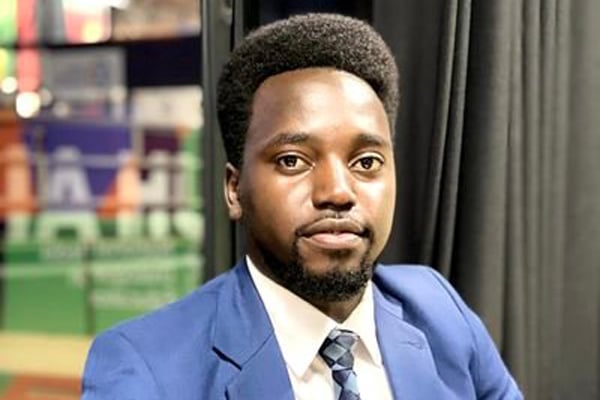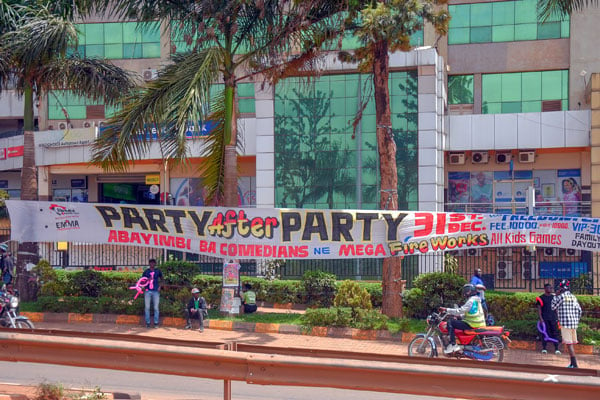Prime
How Kuwait accident shattered two families

Peter Kiiza Akiiki and Ronald Kyomya. Photos | Courtesy
What you need to know:
- Ronald Kyomya, 36, and Peter Kiiza Akiiki, 22, had their hopes cut short barely a year into their stay in Kuwait after they were involved in a road accident. They died on the spot after the driver of a pick-up truck better known as a Tundra, lost control before ploughing into them on January 9, at around 6pm.
Two Ugandan migrant workers have died in Kuwait where they had gone to seek greener pastures to fend for their families back home.
Ronald Kyomya, 36, and Peter Kiiza Akiiki, 22, had their hopes cut short barely a year into their stay in Kuwait after they were involved in a road accident. They died on the spot after the driver of a pick-up truck better known as a Tundra, lost control before ploughing into them on January 9, at around 6pm.
According to reports, the duo, who worked as security guards, were trying to cross a road after alighting from a bus. They were heading to their workstation for a graveyard shift. Two other people were killed in the accident that also left others nursing injuries.
Who was Kyomya?
Kyomya, or Ronnie as his peers and family fondly called him, was a loving family man who hoped to give his children the best of life.
“He had big dreams of giving his children whatever things he had lacked as a child. ‘Nkolerera baana bange’ (I am working for my children), as he always said,” says Christine Naiga, an elder sister.
Born on January 16, 1986, to Erica Matovu and Rosemary Nandugwa, Kyomya died a week shy of his 37th birthday.
Growing up, he chose to study a practical course in mechanics at a garage in his locality after his secondary education. It is from here that he trained as a motor mechanic, a job he practiced until July 2022 when he sought greener pastures in Kuwait.
Before moving to Kuwait, he had already established a foundation for his future dreams in the shape of a house he built for his family in Lukwanga in Wakiso District. Unsurprisingly, his death came as a shock to his family not least because he had only moved to Kuwait a few months ago.
His remains were returned to Uganda on January 27 and taken to his home in Lukwanga for a vigil. He will be buried today at their family ancestral home in Buliika-Busiro, Wamika Town off Hoima Road.
Kyomya is survived by his wife, Ms Faith Nantege Kyomya, their twin sons and a daughter. His elder sister Naiga told this publication that Kyomya was a unique gem whose hard work, love and commitment barely went unnoticed.
Kiiza unplugged
Kiiza’s passing came as a shocker to his kin in Uganda, who learnt of the tragic news through social media posts. The deceased was born on January 28, 2000, to Joseph Karwanyi and Morning Mbabazi in Fort Portal.
Kiiza’s death was hard to take in. Not that any death is, but his backstory is poignant. He was orphaned at a tender age. He first lost his father while aged four. His mother died when he was only five, leaving Ms Peace Karwanyi, an elder sister, to raise him. While Kiiza’s father lost his battle to cancer, Morning Mbabazi died while giving birth.
Caught between a rock and hard place, Kiiza could only get a formal education up to Senior Four. He attended Ibaale Primary School from his Primary One to Six, before moving to Shalom Junior School where he wrote his Primary Leaving Examinations papers. With support from Kabarole Child Development Centre, an organisation that offered him a half bursary, Kiiza was further enrolled for secondary studies at King of Kings Secondary School, Fort Portal, where he studied until his Senior Four.
One of his elder sisters only identified as Eve, had to leave school to fend for the family. After getting his Uganda Certificate of Education (UCE), Kiiza pursued a driving course. His intention was to use the driving permit to seek employment as a driver abroad.
After lots of unsuccessful trials seeking travel documents from the Internal Affairs ministry and other relevant authorities, Kiiza’s lucky break finally arrived in mid-2022. There was just one more stumbling block after he managed to get his papers—he had no funds to facilitate his travel fees. His family had to sell a piece of the family land to finance the trip to Kuwait in late September 2022.
Kiiza loved a good life as per Eve. She adds that her little brother was working towards it so he would raise the status of his family that had long suffered.
“He even talked to me to train him as a barista in Fort Portal before he left the country,” Mr Wilson Imoo, a childhood friend, said of his last moments with Kiiza in Uganda.
Kiiza’s body was flown back to Uganda on January 20. He was later buried at their family ancestral home in Katetembere, Fort Portal, off Kamwenge Road on January 22. Kiiza is survived by a three-year-old daughter.
Ms Karwanyi says Kiiza’s death has left them in much despair and loss with no hopes of recovery. She says their brother was still paying some of the debts he left in Uganda.
Additionally, also his burial arrangements were done with borrowed money that they do not know how they will repay.
Repatriation of corpses
Meanwhile, the Ugandan community in Kuwait was taken aback by the twin deaths.
“On the morning of Tuesday, January 11, we were informed that our colleagues did not reach work and did not return either,” Ms Mariam Namutebi, the team leader of Ugandans in Kuwait under their umbrella body—the Association of Ugandans Living in Kuwait, told this publication.
She adds that at that point, they knew their members were in danger. Since they had learnt of an accident that happened the previous day, they rushed to the intensive care unit of the area hospital. To their dismay, their bodies were not found. The hospital’s security team told them to go to the city mortuary. In Kuwait, when a person dies on spot, their corpse is immediately taken to the mortuary.
Every migrant staying in Kuwait must have a sponsor who helps them in acquiring a working or stay visa. In this case, both Kyomya and Kiiza’s sponsors were required to present their personal documents such as a photocopy of passport, ID card, etc. These documents were used in identifying the deceased’s bodies and issuing medical reports from the mortuary before they were officially handed over to the Ugandan community.
A medical report from the mortuary entailing details of the deceased, together with details of their sponsors, were sent to the embassy so as to issue a letter known as “letter of no objection.” This would permit the repatriation of the bodies.
This letter is also an introduction and order to the deceased’s sponsor to make arrangements of seeing the body repatriated.
Ms Namutebi says Uganda has no embassy in Kuwait and, therefore, Ugandans there use the Saudi Arabian embassy. Upon receiving this letter, their sponsors made all the clearances and the next step was connecting with the deceased’s families back home. Their relatives were sent the death certificates and medical reports, which they would show at Entebbe airport to claim the bodies.





